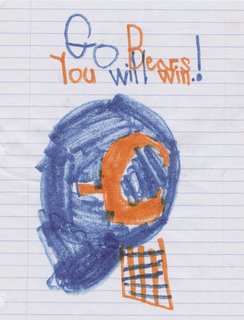This Sunday the Associated Talmud Torahs of Chicago are sponsoring an internet awareness program this Sunday, July 8, at Congregation KINS in West Rogers Park. Discover strategies to set up a safe environment for internet use. The program starts at 7:45 PM. Mincha will be at 7:30 PM.
For more information feel free to contact the ATT at (773) 973-2828.
Totally seperate note:
A Simple Jew asks himself an important question.
Category Archives: Chicago
Summer of Sequels…
 (Make slick signs here)
(Make slick signs here)
He’s right, we do crave the familiar. At least, I do.
I remember hearing a tape by Rabbi Akiva Tatz (the Chicago Community Kollel brough him in to speak in 1998 and I purchased a tape) discuss the idea that ones’ neshama naturally gravitates toward mitzvos. That’s why, he said, when someone becoming observant learns a concept or a certain halacha dealing with Shabbos or Kashrus, for example, it clicks or makes sense to him or her. We feel as if we ‘knew it’ already.
It could also be why lighting the menorah and having some sort of a Pesach seder are the most common Jewish ‘rituals’ celebrated by our not-yet-Observant brothers and sisters (see this post). On a neshama level we connect with these actions.
There are time in life when I hear, see, or am reminded of something and a wave of happiness, content, or excitement comes over me.
Example: Several years ago I was able to hear Rav Shmuel Brazil daven Hallel on Simchas Torah in Yeshva Shor Yoshuv. Whenever I hear certain niggunim I am transported back to an incredible 45 minutes of intense davening and simcha.
Example: After about a year of living in Indianapolis I stumbled upon a 7-11 store. Ahhh…Slurpees! A favorite drink of mine anytime of the year. Just seeing those familar numbers “7” and “11” gave me a weird feeling of comfort. It’s the same way when we drive to New York and start seeing signs for different expressways, bridges, and tunnels.
The neshama (and in the case of Slurpees, the guf) craves what it knows…Torah and Mitzvos. It’s interesting what things we hold dear from childhood through adulthood.
So, coming back to sequels (yes, I intended to make the pun…ha-ha), this is trend of the “summer of sequels” might just be an echo of something much more deep. Thanks for reading!
Boys Night Out
Motzai Shabbos my son and I went out. We went to a Mesibas Lag B’Omer hosted by the Chicago Center for Torah & Chessed, which is under the leadership of Rav Yehoshua Eichenstein.
We both had a great time. The bonfire was awesome, as was the Diet Mountain Dew. There was plenty of dancing and my son ran into some friends from his class (which is always nice). We danced and sang together around the fire, with other yidden in West Rogers Park. It was beautiful to see my 7 yr old son having such a great time just enjoying the pure simcha of the moment!
We really didn’t know that many people there (we did go there with very good friends, though), and the majority of the kids there were not from the school we send our kids to, but together we danced and remembered Rabbi Akiva, Shimon Bar Yochi and their Torah.
As we walked home, I asked my son if he had a good time. He said the bonfire rocked! He then said, “Abba, the best part was when you said the we should dance. Then you asked me if you thought I could keep up with everyone. But, I was the one going faster than you. I was pulling you and you had to keep up with me!”
We put effort, time, and tefillah into our kids to follow a certain path. In the end, it’s the children, at times, who end up leading us.
Shadows of Slabodka in HTC
Recently I happened to be working as a mashgiach at a chasunah, and I spoke with a someone who had received semicha from HTC. I casually asked him about one of the names listed: Rav Selig Starr, z’tl.
Rav Starr was , “A walking adverisement for Slabodka”.
The Alter once told them “I am supposed to teach you mussar. What can I teach you?
The talmidim answered that you are chiav misah.
The talmidim answered that you are chiav misah.
Again, the talmidim answered that you are chiav misah.
I think the approach the Alter was trying to teach was the reason that Slabodka infuenced the creation and expansion of successful Yeshivas in America. Torah when properly taught is meant to bring someone up (part of the Slabodka philosophy). A sensitivity to the individual and they way we teach Torah to children is the yesod of successful chinuch, in my opinion.
For more information about Rav Starr, including his famous “Ten Commandments” click here.
The Lonely Blogger of Faith
As I wrote previously, I had intended to, and did, finish The Lonely Man of Faith during Chol Hamoed, in time for Rav Soloveitchik’s yarteitz. I wasn’t planning on blogging about it, but the one year anniversary of this blog just passed last week (April 12th) and I got to thinking and reflecting on things.
I first read LMoF during several afternoons in Gilo Park. It was a quite open space to read and think about if I really got it or not. That was 17 years ago. I really didn’t get the whole essay, I admit. The two Adams, community, lack of connection to a greater whole…if you’ve read it you know what I’m talking about.
So there I was this past Pesach reading it again. This time I was in a friends’ home, with my six month old on my lap, my 4 yr. old daughter singing some song she made up about “matzah, butterflies, and Polly Pockets” and my 7 yr. old son and two friends engaged in a high intensity game of Celebrity Kugelach Yom Tov Showdown! A far cry from Gilo Park. And a far cry from being lonely.
My Blogoversary came and went and I still hadn’t posted. Something I had read in LMoF kept creeping back in my mind. It was the last two sentences of chapter four. The Rav write about Adam’s (the second) need for a community.
His quest is for a new kind of fellowship, which one finds in the existential community. There, not only are hands joined, but experiences as well; there, one hears not only the rhythmic sound of the production line, but also the rhythmic beats of hearts starved for existenial companionship and all-embracing sympathy and experiencing the grandeur of the faith commitment; there, one lonely soul finds another soul tormented by loneliness and solitued yet unqalifiedly committed.
I started this blog a year ago for several reasons. The main on was to get back into the regular habit of writing. Another reason was to try express some thoughts and ideas in a format that would be readable and maybe interesting to others.
Along the way I’ve learned a lot about myself and my relationship with those I care for and for Hashem. I’ve also learned that the posts I’m most proud of are the ones I’ve written (most of which get few if any comments). I also learned that the one time I wrote a post for the ‘people’, it wasn’t in the spirit of what I’m all about.
Interstingly, I found other out there who have very important, deep, and humorous things to say. The JBlogosphere is a community very similar, IMHO, to what is described by the Rav in the quote above. I suppose that on some level, I was in a way lonely and was looking for a ‘community’, abeit a virutal one when I started blogging.
The truth is that I really own a tremendous thanks to my Uberwife, who not only has listened to me talk about ‘blog related things’, but as has encourage me to continue writing.
I would like to thank one blogger that I reguarly exchange emails, links, and ideas with. If he is reading this, he knows who he is.
Deepest thanks to those who link my blog and to Ezzie and Rafi G, who were the first people to actually link one of my posts.
I’d like to also think a rather popular Chicago Blogger who was kind enough to reply to an email sent by a newcomer in Chicago. His kindness to answer an email from a stranger is indicative of the truth that most Jbloggers out there are nice people.
Thanks for reading and commenting.
Pre-Pesach Post
Five years ago on erev Pesach I came into our kitchen found my wife soakng the Romain lettuce before checking it for bugs.
I noticed that she was soaking the lettuce in the sink insert that we use for the ‘dairy’ side of our sink.
I, of course, over-reacted and freaked out on the spot!! I was in a complete panic.
Several questions exploded in my brain at once:
What are we going to do? What’s the status of our lettuce? Milchig or Fleishig? Could we use it? Would we be able to get more romaine in time? Should I even be worried?
I decided to call a well know posek (in Chicago) and ask about our lettuce.
B’H, he answered his phone. I explained what had happened and he asked, “When was the last time we used the Pesach sink bin?”
Not since last year, I answered.
The he calmly told me, “It’s not a mitzvah to make your wife crazy before Yom Tov. Your lettuce is fine and enjoy your Pesach.”
A Quote:
From my earliest youth, I remember that the children would ask each other on the first morning of Pesach, “How long did your Seder last?”
This was true in my youth, and it is still the case today. If the children were to ask me this now, I would answer them, “I made sure to eat the afikoman before chatzos (midnight).”
-Rav Shimon Schwab (from Rav Schwab on Prayer-page 541)
A Thought:
The word Pesach doesn’t only mean to “pass over”, it can also mean the “mouth speaks”. This, of course, fits nicely into the mitzvah of telling the story of our exodus from Mitzrayim. It is a verbal mitzvah. The whole evening we read, ask questions, sing, and discuss things pertaining to the Seder.
The minhaggim we have on Pesach have been passed down to us (either from our own families or we have taken upon the minhaggim ourselves over the years) in the oral tradition.
I find it interesting that most Jewish families have some sort of Seder on Pesach. While they may be unaffiliated or association themselves with camps outside of Torah Judasim, they connect on some level with the Pesach experience.
An experience involving a Haggadah rooted in Torah sh’bechsav. A Haggadah that is based on Midrash, Mishna, and Gemorah- the main elements of our Oral Torah.When we open our mouths at the Seder we are not only attaching ourselves to a powerful mitzvah, but we are connecting with previous generations and building memories for future generations, as well.
A Request:
My wife mentioned to me that I should blog about this issue of ona’as devarim (hurtful words) and Pesach. A seemingly casual question like, “Have you turned over yet?” might be a sore topic for some couples.
While one may be proud that they “turned over for Pesach” five days or even a week before yom tov, it only makes those who have yet to turn over or got a late start feel bad. The same could be said for telling friends what delicious food one ate at the Seder or what plans you have for Chol Hamoed.
A Link:
Run, don’t walk, to read A compass for a journey by Rafi G. In fact, if you have time take a look at some of this other postings.
Back to Echo Base
Thoughts on the Superbowl

The drawing above of a Bears helmet was done by an outsanding 7 year old boy currently in first grade, my son.
If I were a sports fan, in theory, I would be torn about the upcoming game between the Colts and the Bears. I dedicated almost eight years of my life to the Jewish community of Indianapolis. I, now, currently reside in Chicago. For me, it really doesn’t matter who wins… I’ve never been too into sports.
For my son, well, it’s a different story altogether. His love of the Bears has grown over the past year. He has ‘subliminally’ been showing his team pride over the past few weeks with his drawings and colorings of the weekly parsha. First it was Yosef’s me’il that was colored blue and orange. Then it was a Bears blanket that covered Paro as he slept and dreamed. Most recently it was a picture of two Jewish slaves working in Egypt, wearing Bears jerseys.
As I said, I’ve never been too into sports. But I keep up with the scores, watch some of the games with him (and let him explain things to me) and try to bond with him. It’s important to show interest in what our kids are interested in. My neighbor is a huge Chicago sports fan (Sox not Cubs). I have observed the special bond he has with his oldest child when it comes to sports. I know that I cannot make myself into a sports fanatic, but I try to use things like “da Bears” as a way of bonding with my son. My son is wise to me. He knows that I’m not as into it as other dads, but he’s cool with it. He sees that I make the effort and I hope there is something to be said for that.
An observation: In a city devided by baseball like Chicago it’s nice to see people rally behind one common goal…the Bears. There is a lot that I take away from such unity, even on a gachmius level.
Note: I do enjoy watching the XGames!
Expanding Rubber Bands
I’ve quoted this before, but in second chapter of Mesillas Yesharim it states that:
Last week my wife asked me to go bring in some milk from the car. I “stopped for a second” to check my email on the way and found myself sitting at the computer for 15 minutes. It was 32 degrees outside and the milk was fine, but that’s not the point. My wife asked me to do a simple thing and I let myself get distracted. That’s the point. I should not have touched the computer when I had something else to do. I could have used a rubber band then (of course now everyone at home is ready to shoot rubber bands at me thanks to my new mussar exercise). Things that so natural are the things that I often don’t make conscious decisions about.
Results of my "Question to JBloggers"
Originally I had hoped that my blog survey would highlight blogs as a kind of a bridge between generations of Jews. In theory, this was a nice idea. It would have added another positive aspect of Jblogging to the mix. The best bridge between generations is our Torah.
Jblogs are a great vehicle for yidden to have an opportunity to read other views on different hashkafos (read legitimate forms of avodas hashem). In a way Jblogs do help some generations understand what frum people deal with and what is on our collective mind.
I’ve got a majority of Gen Xers, a few Millennials and 6 or 7 readers who are at the edge of baby boomers and the Silent Generation who just turned 60.
Blogging is fun. I enjoy writing and the allure of having an audience gives me a warm and fuzzy feeling, I admit. But I have found myself thinking even before I posted my Question for JBloggers, does my blogging comes at the expense of my own personal involvement within my Jewish community?
Is it the Baby Boomers who haven’t picked up on the medium of blogs or do they know something that I don’t? Time will tell. For now, I continue to write and hopefully will get more involved off-line, as well. Thanks for reading.
If anyone is interested in reading more about generations and their impact on history I suggest anything by William Strauss and Neil Howe or check out fourthturning.com.





